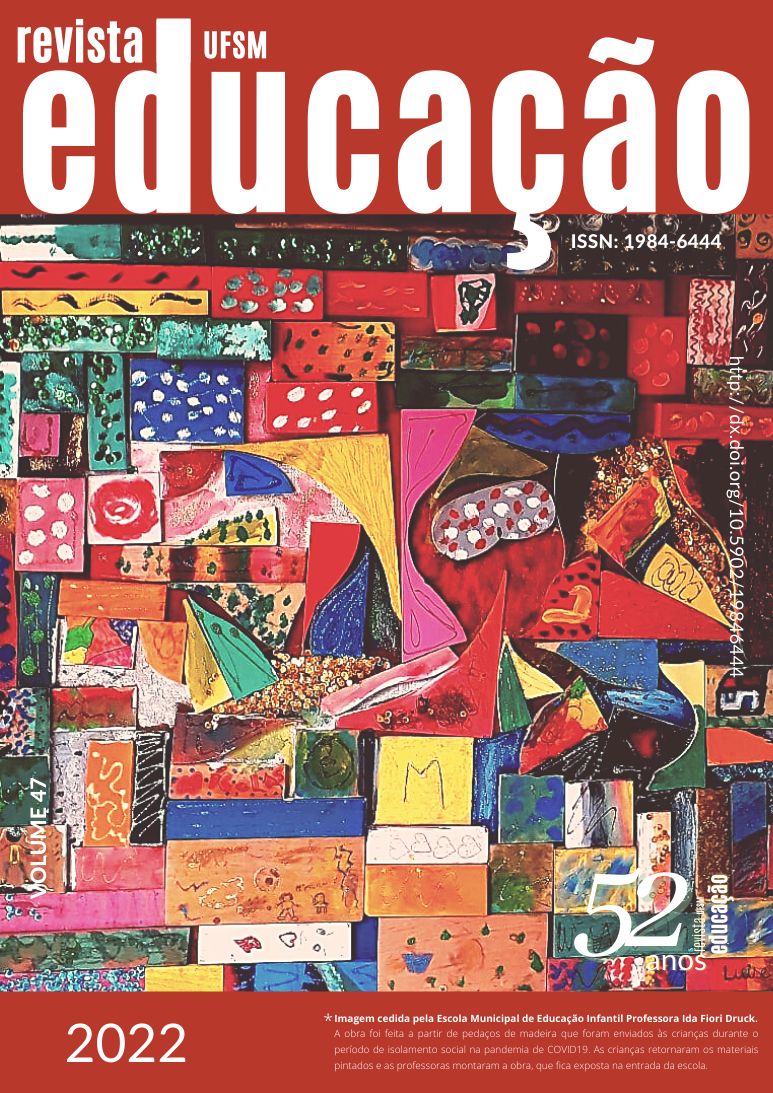Body, stereotype and education: ideological conventions and formation
DOI:
https://doi.org/10.5902/1984644464588Keywords:
Body, Stereotype, EducationAbstract
This article discusses the ideological dimension of stereotypes of beauty and body aesthetics that, in technological society, are present in media reports. The processes of adapting and reordering the aspirations and sensitivity of individuals focused on the social structure of consumption are examined. Thinking about a critical education about the standardization of human conscience, looking for foundations in the Critical Theory of Society, contributes to understanding individual manipulation in the context of contemporary society. There are subtleties by which the cultural industry transfers to tradable products and services, focused on physical beauty and fitness, human aspirations capable of leading individuals to incorporate consumer stereotypes in investments in their bodies. In this sense, education can be a training space for resistance, by conducting teaching that reveals the false relationships between aesthetics, health and body performance, strengthened by the cultural industry.
References
ADORNO, Theodor Ludwig Wiesengrund. Filosofia y supersticion. Madrid: Alianza/Taurus, 1972.
ADORNO, Theodor Ludwig Wiesengrund. Mínima moralia. Reflexões a partir da vida danificada. São Paulo: Ática, 1992.
ADORNO, Theodor. Ensaios sobre psicologia social e psicanálise. Tradução Verlaine Freitas. São Paulo: Editora UNESP, 2015.
ADORNO, W. T; SIMPSON, G.. Sobre Música Popular. In: COHN, G. (Org.). Theodor Adorno: sociologia. São Paulo: Ática, 1986.
ALBINO, Beatriz Staimbach; VAZ, Alexandre Fernandez. O corpo e as técnicas para o embelezamento feminino: esquemas da indústria cultural na revista Boa Forma. In: Movimento (UFRGS. Impresso), v. 14, p. 199-223, 2008.
BENJAMIN, Walter. Obras escolhidas. v. 1: magia e técnica, arte e política. São Paulo: Brasiliense, 1996.
CROCHICK, José Leon; CROCHICK, Nicole. Bullying, preconceito e desempenho escolar: uma nova perspectiva. São Paulo: Benjamin Editorial, 2017.
CROCHICK, José Leon; DIAS, Marian Ávila de Lima. Apresentação. In: CROCHICK, José Leon; DIAS, Marian Ávila de Lima. (Orgs.). Estudos sobre violência escolar entre estudantes. São Paulo: Benjamin Editorial, 2020. (p. 13-16).
CROCHIK, José Leon. Preconceito, indivíduo e sociedade. Temas psicol., Ribeirão Preto , v. 4, n. 3, p. 47-70, dez. 1996 . Disponível em <http://pepsic.bvsalud.org/scielo.php?script=sci_arttext&pid=S1413-389X1996000300004&lng=pt&nrm=iso>. acessos em 13 jan. 2021.
ECO, Umberto. História da beleza. Rio de Janeiro: Record, 2004.
FABIANO, Luiz Hermenegildo. O desaparecimento do sujeito: alienação e ideologia. In: CHITOLINA, C. L.; HARTMANN, H. R. (Org.). Filosofia e aprendizagem filosófica. Paraná: Dental Press Editora, p. 227-240, 2002.
FABIANO, Luiz Hermenegildo. O signo sexual: apropriações ideológicas. 1986. Dissertação (Mestrado em Educação) - Universidade Metodista de Piracicaba, Piracicaba, , 1986.
FABIANO, Luiz Hermenegildo; PALANGANA, Isilda Campaner. Identidade e cultura mercantilizada. In: Revista Psycologica. Coimbra: Gráfica de Coimbra, v. 27, p. 233-244, 2001.
FREUD, S. Obras Completas. Versão eletrônica brasileira da obras psicológicas completas de Sigmu nd Freud. Rio de Janeiro: Editora Imago, 1997.
GILIOLI, Eduardo Borba. O esporte nas aulas de educação física no ensino médio: convenções ideológicas e resistência. 2020. Tese (Doutorado em Educação) - Universidade Estadual de Maringá, Maringá, 2020.
HANSEN, Roger; VAZ, Alexandre Fernandez. "Sarados" e "gostosas" entre alguns outros aspectos da educação de corpos masculinos e femininos em academias de ginástica e musculação. Movimento (Porto Alegre) , v. 12, p. 133-152, 2006
HORKHEIMER, Max; ADORNO, Theodor Ludwig Wiesengrund. Dialética do esclarecimento. Rio de Janeiro: Jorge Zahar Ed., 1985.
HORKHEIMER, Max; ADORNO, Theodor Ludwig Wiesengrund. Textos escolhidos. In: Os pensadores. São Paulo: Nova Cultural, 1991.
LAPLANCHE, J., PONTALIS J. B. Vocabulário de Psicanálise. 3. ed. Lisboa, Portugal: Mores Editores, 1976.
LUNA, Ana Virginia de Almeida et al. Reflexões sobre violência escolar e bullying: primeiras aproximações. In: CROCHICK, José Leon; DIAS, Marian Ávila de Lima. (Orgs.). Estudos sobre violência escolar entre estudantes. São Paulo: Benjamin Editorial, 2020. (p. 169-187).
MARCUSE, Herbert. A ideologia da sociedade industrial. 5.ed. Rio de Janeiro: Zahar, 1979.
MATOS, O. A escola de Frankfurt: luzes e sombras do Iluminismo. São Paulo: Moderna, 1993.
MATOS, O. Filosofia: a polifonia da razão. São Paulo: Scipione, 1997.
PRATA, H. L.; SILVA, E. G.; ALVES JÚNIOR, E. D. “Pelo meu histórico de atleta […]”: a análise do discurso e a linearidade esporte-saúde. Movimento, Porto Alegre, p. e26095, dez. 2020. Disponível em: <https://seer.ufrgs.br/Movimento/article/view/105511/60109>. Acesso em: 15 jan. 2021. doi:https://doi.org/10.22456/1982-8918.105511.
REVISTA VEJA. Por que o histórico de atleta não garante imunidade contra a Covid-19? 7 de julho de 2020. Disponível em: <https://veja.abril.com.br/blog/maquiavel/infectado-pela-covid-19-bolsonaro-colocara-a-prova-historico-de-atleta/>. Acesso em: 15 jan. 2021.
RUBIO, K. O legado heróico do papel social do atleta. In: BRASIL. Legados de megaeventos esportivos. Brasília: MEC, 2008. p. 217-225.
SANCHES, E. O. Fabiano, L. H.. Linguagens Autoritárias Contra o Corpo: educação pelos estereótipos e tortura subliminar.. Revista Convergência Crítica, v. 2, p. 191-203, 2013.
SILVA, A. M. Corpo ciência e mercado: reflexões acerca da gestação de um novo arquétipo de felicidade. São Paulo: Autores Associados, 2001.
THÁ, Fabio. Representação e Pensamento na Obra Freudiana. Ágora. v. VII, n.1; jan/jun. p.109-128. 2004.
Published
How to Cite
Issue
Section
License
Copyright (c) 2022 Educação (UFSM)

This work is licensed under a Creative Commons Attribution-NonCommercial 4.0 International License.
Declaration of originality
We declare that all articles present in the journal Educação (UFSM) are originals and were not submitted for publishing on any other publication, as a whole or a fraction. We also declare that, after being published by Educação (UFSM), a paper will not be submitted to another journal within two years. After this time, our journal transfers the publishing rights to the authors, with a permit granted by the Editorial Council.
We also acknowledge that the originals’ submission to Educação (UFSM) implies on a transference of copyright for physical and digital publishing to the journal. In case of noncompliance, the violator will receive sanctions and penalties predicted by the Brazilian Copyright Protection Law (n. 9610, dated 19/02/98).
Attribution 4.0 International (CC BY 4.0)
This license lets others remix, transform, and build upon the material for any purpose, even commercially, and copy and redistribute the material in any medium or format.

This work is licensed under a Creative Commons Attribution 4.0 International (CC BY 4.0)






